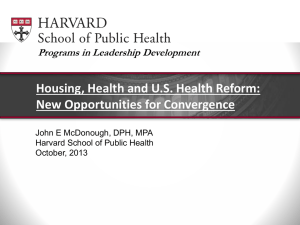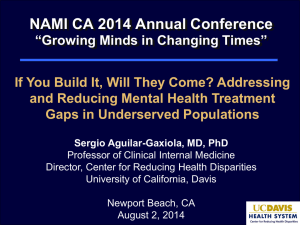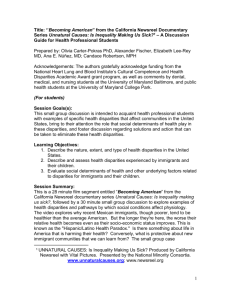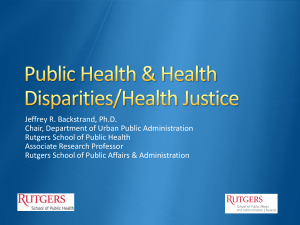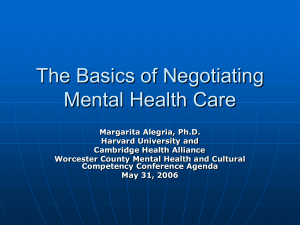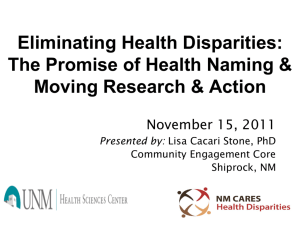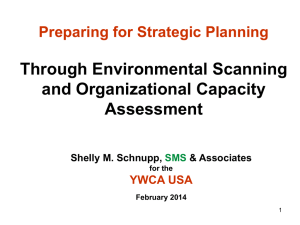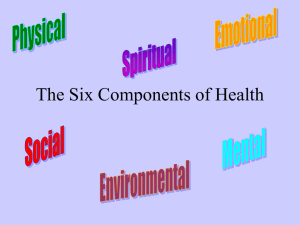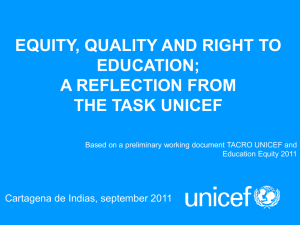Health Equality Perspective
advertisement
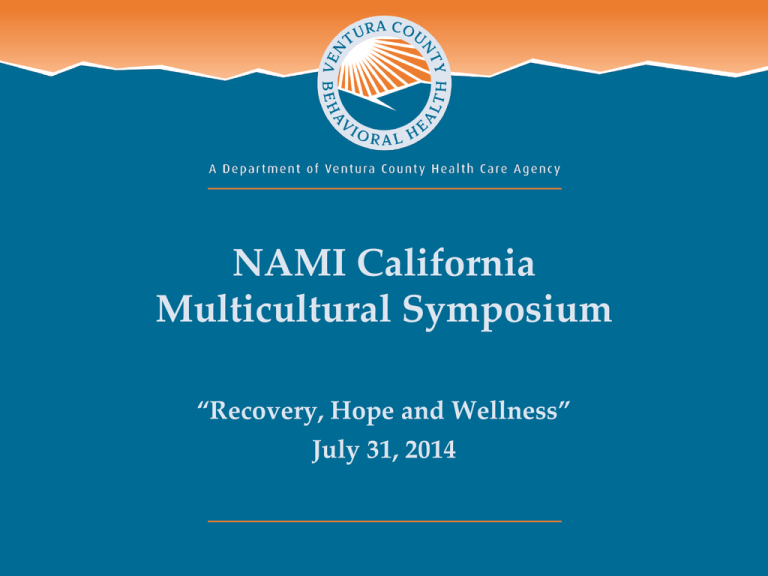
NAMI California Multicultural Symposium “Recovery, Hope and Wellness” July 31, 2014 Reducing Disparities Page 2 Prevention Continuum of Services Institutes of Medicine – I.O.M. INDIVIDUAL interventions for Danger Signs / Use those with early signs of SUD/MHD but “sub-clinical” / “prodromal” SPECIALIZED or culture-specific Elevated Risk – Family Setting, SES, etc. Entire Population – Prevent Onset or Delay Age of First Use, Alter Community or Group Norms to Support Public Health and Safety Page 3 strategies for high-risk groups at elevated risk for problems (e.g. 18-24 y.o. latinas, suicide) UNIVERSAL strategies to address broad array of LOCAL problems among an entire community Latino Participation in MHSA Planning Processes In 2005, 23.5% of the total participants in 13 CSS Community Forums identified themselves as speaking to the concerns of Latinos. In 2009, improved representation in 13 PEI Community Forums: • 71% Latino • 41% Mexican • 39% Migrant Farm Workers • 26 % Mixteco • 17% Zapoteco Page 4 PEI in Ventura County WHO has the greatest need? Based on data indicator report 2009 by EVALCORP Page 5 PEI in Ventura County HOW are we serving these needs? Page 6 Strategic Directions: Reducing Disparities* 6. Community Capacity-Building and Outreach and Engagement 1. Academic and School-Based Mental Health Programs 5. Culturally and Linguistically Appropriate Treatment 2. Community-Based Organizations and Co-Locating Resources 3. Community and Social Media 4. Workforce Development * CRDP Latino Population Report, UC Davis Center for Reducing Health Disparities, 2012 Page 7 Strategic Direction #1: Academic and School-Based Mental Health Programs • Positive Parenting Program “Triple P” • Olweus Bullying Program • 21 School Districts/SELPA Contract to provide “educationally necessary” mental health services through the IEP. • Break-Through Student Assistance Program • Most schools refer to EPSDT and allow access to therapists during school day. • Positive Behavioral Intervention Support (PBIS) Page 8 Strategic Direction #2: Community-Based Organizations and Co-Locating Resources Faith-Based Collaborations • Guadalupe Church, Project Esperanza • St. Paul Baptist Church • Word of Life: Community Coalition for Stronger Families Co-located Integrated Primary Care • Health Care Agency: Fillmore, Oxnard, Santa Paula, Simi Valley, Thousand Oaks, Ventura • Clinicas del Camino Real Page 9 Strategic Direction #3: Community and Social Media • Latino Internet Access • WellnessEveryday.Org – SaludSiempreVC.Org • Media Outreach: TV, Radio, Print, Online • Vida Newspaper • Gold Coast Broadcasting – Radio Lazer • Movie Theatre Promotions • Fotonovelas • La Historia de Paco • La Historia de Teresa • Community Events • Día de los Muertos Page 10 Strategic Direction #4: Workforce Development • Bilingual Psychiatrists – Contracted at Higher Rates • Bilingual Employees – Differential Certified by Human Resources • Introduction to Public Mental Health – High School Curriculum at Hueneme High School • Internship Program – Bilingual Stipends Page 11 Strategic Direction #5: Culturally and Linguistically Appropriate Services • Cultural & Linguistic Competency Training (878 in FY 12-13) • Language Assistance Services (2,976 hours in FY 12/13): Interpreter In-Person/telephone service, American Sign Language, Indigenous Language – Mixteco • Santa Clara Valley Wellness Outreach Project: Promotores y Promotoras Foundation, Lideres Campesinas • Performance Improvement Project - Language Assistance Services Evaluation • BreakThrough Student Assistance Program – Conejo Valley Unified School District Page 12 Strategic Direction #6: Community Capacity-Building and Outreach and Engagement • Promotores Y Promotoras Training • City Impact – Community Coalitions for Stronger Families • Kids & Families Together – Foster Youth Kinship Project Page 13 Reducing Disparities – In Progress Co-location of our largest clinic with primary care, specialty care & The Wellness Center in a location easily accessible by public transit. Build on relationships: Faith-based, Schools, and expanded to other orgs. Work with primary care – to be sure people are being managed at the appropriate care level. Page 14 Reducing Disparities – The Opportunity •Bring in an expert – fresh look/gain perspective Systems change with a local focus Stakeholders – common cause & focus Collective IMPACT Page 15 Wellness for a Community at Risk EMOTIONAL ENVIRONMENTAL Developing skills and strategies to cope with stress. Good health by occupying pleasant, stimulating environments that support well-being. INTELLECTUAL Recognizing creative abilities and finding ways to expand knowledge and skills. FINANCIAL Satisfaction with current and future financial situations. WELLNESS SOCIAL Developing a sense of connection and a well-developed support system. PHYSICAL SPIRITUAL Recognizing the need for physical activity, diet, sleep, and nutrition. Search for meaning and purpose in the human experience. OCCUPATIONAL Personal satisfaction and enrichment derived from one’s work. Page 16 Reducing Disparities – The Opportunity Page 17 Working Together to Achieve the Vision “We envision a future when everyone with a mental illness will recover, a future when mental illnesses can be prevented or cured, a future when mental illnesses are detected early, and a future when everyone with a mental illness at any stage of life has access to effective treatment and supports — essentials for living, working, learning, and participating fully in the community.” Final Report Presidents New Freedom Commission 2003 Page 18
